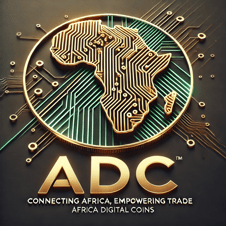Africa Digital Coins (ADC)

Advance Training (3 Days)
Price: £750.00
Training to be held in Accra - Ghana
Scope: This course is targeted at African governments, regional bodies (ECOWAS, EAC, SADC, etc.), and the African Union.
Government & Regional Training (3 Days): Policy, Regulation, and Strategy
Day 1: Understanding Digital Currency in Government Policy
1. The Role of Digital Currencies in National Economies: How digital currencies can strengthen African economies and increase GDP.
2. Blockchain for Government Services: Exploring blockchain applications in public services like land registration, voting, and taxation.
3. Regulating Digital Currencies: How governments can create frameworks to regulate digital currencies effectively.
4. Cross-Border Payment Systems in Government: How regional bodies can facilitate easier trade and remittance flows using digital currencies.
5. Building Trust in Digital Systems: How governments can promote public confidence in blockchain and digital currency.
6. National Digital Currencies (CBDCs): Exploring the development of Central Bank Digital Currencies (CBDCs) across Africa.
7. Case Studies from Other Nations: Real-world examples of how countries have successfully adopted blockchain technology and digital currencies.
Day 2: Developing a Regulatory Framework
1. Creating Digital Currency Legislation: Guidance on drafting laws to regulate digital currencies and protect consumers.
2. AML and CFT (Countering the Financing of Terrorism): Implementing anti-money laundering and counter-terrorism financing standards in digital finance.
3. Intergovernmental Cooperation on Digital Currency: How regional governments can work together to create unified digital currency standards.
4. Ensuring Consumer Protection: Developing legal frameworks to protect citizens from fraud and ensure transaction security.
5. Digital Identity in Blockchain: Using blockchain technology to enhance digital identity verification and governance.
6. Managing Cross-Border Regulatory Issues: Overcoming challenges related to cross-border digital payments and trade regulation.
7. Building Regulatory Sandboxes: How governments can create ‘sandbox’ environments for testing digital currency innovations in a controlled setting.
Day 3: Implementing Digital Currency Strategy
1. Integrating Digital Currency into National Payments Systems: Practical steps for embedding digital currencies into existing financial infrastructure.
2. Developing a National Blockchain Strategy: Designing strategies to promote blockchain use across industries.
3. Public-Private Partnerships for Digital Currency Adoption: How governments can collaborate with private firms to promote adoption of digital finance.
4. Driving Economic Inclusion through Digital Currency: Strategies for using digital currency to increase financial inclusion and reduce poverty.
5. Cybersecurity in Government Digital Finance: Building strong cybersecurity frameworks to protect public digital currency systems.
6. Taxation of Digital Assets: How governments can tax digital currencies without stifling innovation.
7. Long-Term Vision for Africa’s Digital Economy: How digital currencies can transform Africa’s economic future in the global market.
Contact Us
Email: info@africadigitalcoins.com
Subscribe
Connect with Us
Office Tel: +44-208-145-3355
Address: Ability House, 121 Brooker Road, Waltham Abbey, EN9 1JH, United Kingdom
Copyright © 2025. All rights reserved. Africa Investment House (AIH) Limited trading as Africa Digital Coins
